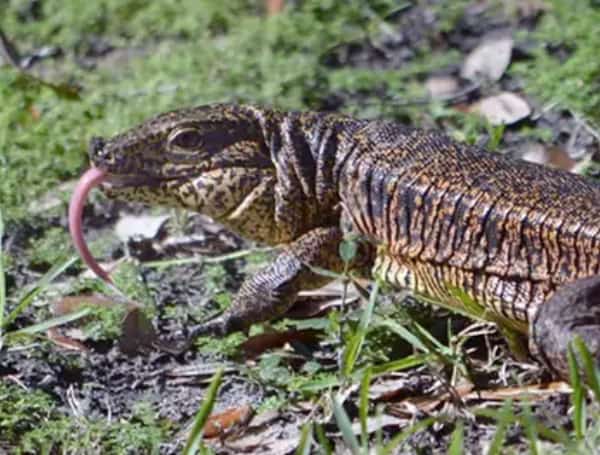The gold tegu, also known as the golden tegu, is native to South America but can be found in Florida. Commissioners with the Florida Fish and Wild

Commissioners with the Florida Fish and Wildlife Conservation Commission (FWC) directed staff to take bold steps to protect Florida’s native ecosystems from invasive fish and wildlife.
During the February meeting, Commissioners tasked staff with drafting proposed rules to prevent the establishment of new nonnative species in Florida. Staff will explore including a risk analysis to prove a species poses little or no threat to Florida’s ecology, economy, as well as human health and safety before that species could be approved to come into the state.
“I have no qualms about saying we are shutting Florida down to invasive species. You are going to have to prove to us that what you are bringing in is not hurting Florida, that it will not harm our native ecosystem,” said FWC Chairman Rodney Barreto. “Look what the Burmese python and the tegu have done already. We are not trying to hurt the industry, but the time has come that we say Florida is off limits to any new species.”
In the news: Florida Fish And Wildlife Commission Approves Rule To Help Survival Of Released Reef Fish
Staff will share any proposal with the Nonnative Fish and Wildlife Technical Assistance Group, also known as the TAG, and will solicit feedback.
Florida is highly susceptible to the successful establishment of non-native and invasive fish and wildlife due to the subtropical climate, multiple ports of entry, and the high levels of live animal trade. Nonnative fish and wildlife can cause harm to Florida’s ecology and economy as well as human health and safety.
More than 500 non-native species have been reported in Florida.
A substantial amount of these has been introduced via the live animal trade with at least 139 established in Florida, meaning they are reproducing in the wild.
Since most nonnative fish and wildlife find their way into Florida’s habitats through escape or release from the live animal trade, it is important to prevent high-risk nonnative fish and wildlife from becoming introduced or further established in Florida’s environment through regulatory action.
In the news: Florida Woman Wins $1 Million From $50 Scratch-Off Lottery Ticket
The FWC uses the regulation of high-risk nonnative fish and wildlife in conjunction with a variety of other management strategies to minimize adverse impacts of invasive species and to prevent the introduction of additional species into the wild.
Android Users, Click Here To Download The Free Press App And Never Miss A Story. Follow Us On Facebook Here Or Twitter Here. Signup for our free newsletter by clicking here.

